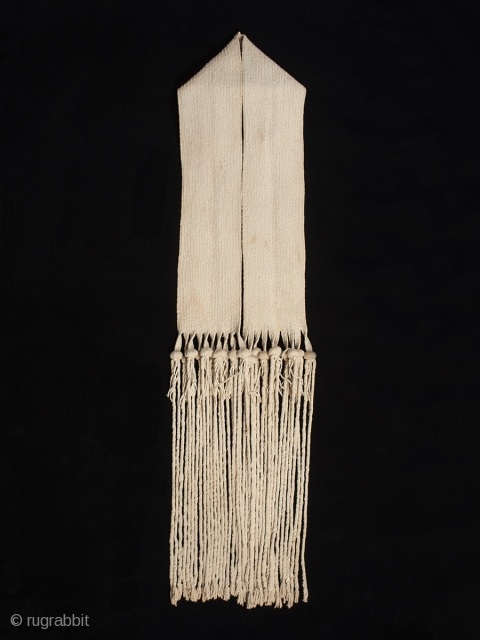This rain sash is in wonderful condition with a little soiling on one side from wear. Inside the balls on the fringe are small pieces of dried corn on the cob. It comes with a custom wall mount as seen in the final photo; the photo above was taken horizontally so the mount shows - normally there would be no dent.
Some history: The groom and other men in the Hopi community weave the bride's robe and sash Sometimes called a "rain sash," the long fringe symbolizes falling rain and the braided balls represent rain clouds. Hopi wedding ceremonies take years of planning and preparation to fulfill respective familial and cultural obligations. Among the many time-consuming, labor-intensive activities is weaving the bride's wedding sash. Presented to her with a robe and ears of corn after the actual wedding ceremony, the cotton sash is carefully rolled in a reed case. The sash's tassels hang out one side of the case, symbolizing the much-needed rain that sustains life for communities in the arid American Southwest. (Source: Peabody Essex Museum)
- Home
- Antique Rugs by Region
- Category
- Profiles
- Post Items Free
- Albums
- Benaki Museum of Islamic Art
- Budapest: Ottoman Carpets
- Gulbenkian Museum
- Islamic Carpets. Brooklyn
- Islamic Textiles. Brooklyn
- Konya Museum: Rugs
- MKG, Hamburg
- MMA: Caucasian Carpets
- MMA: Mamluk Carpets
- MMA: Mughal Indian Carpets
- MMA: Ottoman Carpets
- MMA: Safavid Persian Carpets
- MMA: Turkmen Rugs
- McCoy Jones Kilims
- Ottoman textiles. Met
- Philadelphia Museum
- Rugs and Carpets: Berlin
- Seljuqs at the Met
- TIEM, Istanbul: Carpets
- V&A: Classical Carpets
- Vakiflar Carpets: Istanbul
- Baluch Rugs: Indianapolis
- Gallery Exhibitions
- Jaf an Exhibition
- Alberto Levi Gallery
- Andean Textile
- Christie's London: 2016
- Francesca Galloway
- HALI at 40
- ICOC Washington, DC 2018
- Jajims of the Shahsavan
- London Islamic Week April, 2018
- Mongolian Felts
- Navajo Rugs: JB Moore
- Persian Piled Weavings
- SF Tribal & Textile Art Show 2020
- SF Tribal 2019
- Sotheby's: C. Alexander
- Turkish Prayer Rugs
- Turkmen Main Carpets ICOC 2007











